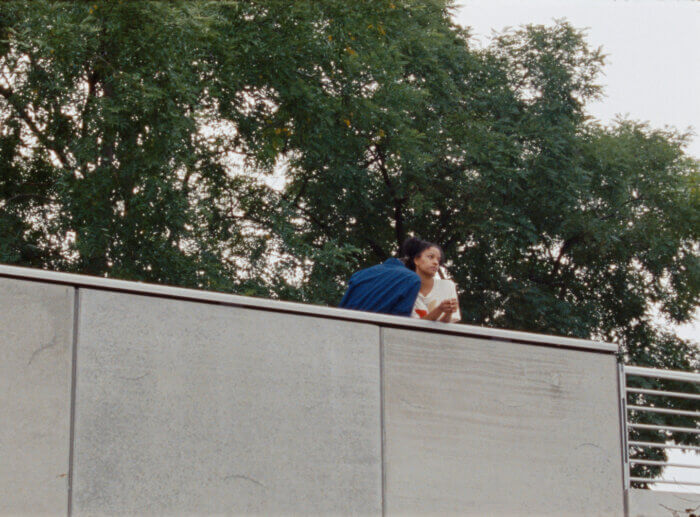Now in its 52nd year, the “New Directors/New Films” festival, which began at MOMA and is now co-presented with Lincoln Center, offers an array of films from around the world. Rather than loading up with buzz-driven Sundance premieres, the lineup offers a selection of filmmakers just starting to establish themselves on the festival circuit. Most entries are debuts.
While its history includes a number of famous names, such as queer directors Pedro Almodovar, Lino Brocka, Luca Guadagnino and Sally Potter, I’ve long valued it for opportunities to see films which may never screen again in this city. As distributors run scared from subtitles, this aspect of ND/NF seems all the more crucial this year. The current selection’s LGBTQ-themed films are India Donaldson’s “Good One,” trans director Theda Hammell’s “Stress Positions,” and Katharina Lüdin’s “Of Living Without Illusion.” I would also recommend the enigmatic surrealism of Spanish director Alberto Gracia’s “The Rim.”
“Good One” isn’t a horror movie, but it lifts one of the genre’s most well-worn devices: A group of people leave the city to go for a trip to the country, leading them into unforeseen danger. (It seems to allude to “The Blair Witch Project” at several points.) “Good One” subtly changes focus, shifting from a story of two troubled men going through midlife crises to a queer teenager finding her own life away from them. Chris (James LeGros) is struggling with the aftermath of a divorce. To distract himself, he takes his 17-year-old daughter Sam (Lily Collias) and friend Matt (Danny McCarthy) on a hike in the Catskills lasting several days. A failed actor, Matt seems dysfunctional from the start: He forgot to bring his sleeping bag but didn’t neglect booze. Chris and Matt no longer have much in common, and Sam ignores them as much as she can, texting with her girlfriend. A chamber piece for the trio, it’s beautifully shot, with Celia Hollander’s pretty synth-folk score enhancing a peaceful scene of Sam and Chris swimming together. Its drama is deceptively quiet, building to a potent story of a girl pressured into independence by having to share space with men.
“Stress Position” tries to take the pulse of New York in the summer of 2020, as the COVID lockdown kicked in. Stuffed with characters and events, it would need to be much longer than 95 minutes to do justice to them all. Moroccan-American model Bahlul (Qaher Harhash) is an object of desire or fascination for most of this circle of frenemies. His uncle Terry (John Early), a bitter gay man who can’t stand his lesbian roommate Vanessa (Amy Zimmer), gets the first of the film’s many voice-overs. Terry’s frenemy is Vanessa’s trans girlfriend Karla (Hammell). The story spins out the hypocrisies and petty jealousy of would-be progressive New Yorkers, who go out to protest racism while objectifying Muslim men and proving their ignorance of the world outside America. (A running joke involves YouTube explainers about the Middle East.) Yet the film spends too much time presenting jerks being cruel to each other without being very witty itself. The voice-overs constantly switch, and the editing becomes confusingly jumpy. Even when Bahlul gains control of the voice-over, he remains idealized in a way that makes him serve as a foil to the white characters’ flaws. It feels like a TV pilot intended to expand on its many minor characters in future episodes. It has a fine ear for the limits of white, queer New Yorkers’ politics, even if it settles for too many cheap shots, but it does not go much further than simply pointing them out.

“Of Living Without Illusion” tackles a toxic, abusive relationship between two women that slowly unravels without fully ending. The friends and relatives of Merit (Jenny Schilly) and Eva (Anna Bolk) believe they’re doing alright, but even the most innocuous scenes contain a hidden tension. A woman climbing a staircase to her bedroom becomes a source of suspense, justified by the emotional meltdown which awaits her at the top. Merit rehearses a play in which she’ll be acting against her ex-husband. Her relationship with Eva is consumed by neediness and a feeling that no amount of emotion could ever be enough. As a director, Lüdin approaches her characters gingerly. (While “Of Living Without Illusion” is her first feature, it follows six shorts going back a decade.) Shooting in Academy ratio on 16mm film and framing them in doorways, she creates a style suited to the decay of emotion. The physical space of Merit and Eva’s house is very important, as is the presence of the outdoors. Doors and windows remain open, becoming traps for people posed against them. Lüdin tends to film actors from the back, withholding close-ups for a few big moments. Although there’s no sex, Merit and Eva show a great deal of physical intimacy, but cuddling each other does not clear up their problems. With a debt to Chantal Akerman, “Of Living Without Illusion” emphasizes small gestures, but they add up to a major mood of disquiet.
New Directors/New Films 2024 | April 3-14 | Film at Lincoln Center and Museum of Modern Art | See https://www.newdirectors.org for full schedule and further details.



































